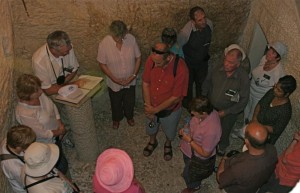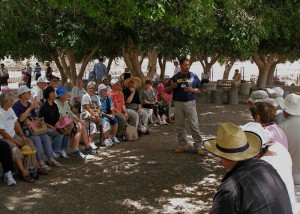A pilgrimage to the Holy Land can be led by any mature person who has some leadership and organising ability and is able to gather together a group of people who are keen to make the trip. A previous visit to the Holy Land is an advantage, but not essential.
Here are some guidelines:
Organising a pilgrimage
• Plan well ahead. A full year allows time to promote the trip. It also gives prospective pilgrims time to plan — and to save the money. You might choose to time your pilgrimage to tie in with a major anniversary or event in the life of your church.
• As soon as the decision is made, contact a travel agent that organises Holy Land pilgrimages. Choose an itinerary and establish the cost. The agent will arrange flights, accommodation, transport and a guide, and usually supply promotional brochures.
• Select a chaplain, preferably someone who is a “people person” and who will be a drawcard for prospective pilgrims.
• Travel agents usually offer free places to the organiser of a pilgrimage and the accompanying chaplain, provided a minimum number of pilgrims sign up.
• Promote the pilgrimage as widely and repeatedly as you can among members of your congregation, their families and friends (see below for promotion tips).
• Be positive, definite and committed. Encourage people to book and pay a deposit.
• If possible, arrange a meeting of pilgrims before departure, to help the group to bond together. If they all belong to one church congregation, this will be easy — and perhaps the church can formally farewell the pilgrims. If a meeting is not possible, at least circulate a list of pilgrims’ names and where they come from.
• Some congregations invite prayer petitions which pilgrims take to include in their prayers at the holy places.
• Read the Gospels before you leave, focusing on passages relating to sites you will visit.
• In conjunction with your chaplain, note biblical references relating to the holy places you will visit (see below for link to list). Also choose appropriate hymns and prayers (some travel agents provide a booklet).
Promoting a pilgrimage
• Promote the pilgrimage wherever there are prospective pilgrims. Be positive, definite and committed. Encourage people to book and pay a deposit.
• Draw up a list of possible pilgrims and send them a personal invitation. Then follow up each month with a further letter or email, giving more information about the trip and the highlights of the itinerary.
• Use any lists that are available to you.
• Promote the pilgrimage in church newsletters, websites and, if possible, local media.
• Don’t neglect person-to-person approaches. People are more likely to sign up if they are approached by someone they know.
• Include everyone — some you might not consider likely prospects may be among the first to pay their deposit.
• Create a mailing list (name, address, phone number and, especially, email address) of everyone who shows any interest. Keep their interest alive by regular emails or letters.
• Create a second list of those who say they cannot come. They may be interested in a future pilgrimage.
• In your emails or letters to prospective pilgrims, give them information about the places you will visit, the weather, currency, what they should bring, etc. (Use the material on this website, and give them its link.)
• Arrange a get-together, with a speaker who has been to the Holy Land, or screen a relevant video or DVD (ask your travel agent). Such an occasion also reassures people who might be reluctant to travel with people they have not met.
• Encourage a tech-savvy pilgrim to set up a Facebook page or WhatsApp group for the pilgrimage after returning home. Then pilgrims can exchange photos and messages, building on the community spirit established on the journey.
• Once you have organised one pilgrimage you will find that some who have travelled with you will want to go again. Your lists and the webpage will provide the means to give news of future pilgrimages.
The leader’s role
As the organiser, you are responsible for providing friendly support for each person in his or her pilgrimage experience, and for maintaining a happy and relaxed group spirit.
Together with your guide, you will be regarded as a source of information about each day’s activities, holy places, meals, hotels, weather and toilet stops. Prior research is advisable.
You will need to develop the knack of keeping things running smoothly (or as smoothly as any group travel exercise is likely to be) without pilgrims feeling over-organised or, worse still, regimented.
Your travel agent will probably have guidelines for you to follow, but here are some tips for when you are on the road:
• Be sure to establish a friendly and co-operative working relationship with the local guide. But don’t let the guide depart from the itinerary without good reason, or linger too long at shopping stops.
• At border controls, you may need to speak to officials on behalf of your group.
• Your travel agent should have given you lists of members of the group and their passport numbers, as well as check-in procedures and contact information for agents along the way. Keep these safe.
• In collaboration with the chaplain, schedule a period of prayer each day, perhaps on the bus in the morning, and worship at one of the holy places. Assist the chaplain in obtaining a suitable space for religious services at the hotel, if required.
• Keep lunch stops and shop visits brief; they can easily reduce time for prayer and reflection at holy places.
• Supervise the loading and unloading of baggage at each stop (it’s wise to ask pilgrims to personally check that each of their bags has been loaded or unloaded).
• In conjunction with hotel staff, supervise the allocation of rooms at each accommodation place. Keep a copy of the room list.
• Brief pilgrims about security facilities at each accommodation place, and how and where they can exchange money.
• Obtain the guide’s advice on precautions against pickpockets or unsafe areas.
• Remind pilgrims about times for meals, religious services, wake-up calls, placing bags outside their rooms and boarding the bus.
• Before each departure, check that pilgrims have returned room keys, paid personal expenses, and uplifted passports or money from their room safe. Count heads to ensure that everyone is on the bus.
• Endeavour to schedule regular gatherings to brief pilgrims on upcoming activities, and to allow them to share experiences or raise concerns.
• Be prepared for your group to offer a song from your own country as a gesture of thanks for hospitality (you may need copies of the words).
• During visits to sites, keep the group together and watch out for stragglers. There will always be one member of the group who is usually late, or doesn’t fit in well with the others. Your patience may be tested.
• Be prepared to sacrifice some of your own self-interest for the benefit of pilgrims.
• If anyone falls sick or has an accident, check if medical assistance is needed. If so, obtain medical assistance, in conjunction with the guide or hotel staff (prior authorisation from the pilgrim’s medical insurer may be necessary). Arrange for meals to be taken to the sick pilgrim.
• At the end of the pilgrimage, formally thank guide and driver, and present them with tips.
The chaplain’s role
The chaplain works closely with the pilgrimage leader in providing pastoral care and spiritual direction. This includes leading prayer and worship, and providing spiritual reflections at holy places.
The travel agent will probably have guidelines for the chaplain to follow, but here are some tips:
• Provide a daily period of prayer, perhaps on the bus in the morning, and worship at one of the holy places. Obtain suitable facilities for religious services at the hotel, if required.
• Relate easily with each member of the pilgrimage, moving around the bus and joining in natural groupings during site visits to make personal contact.

A chaplain leads prayer in “Christ’s Prison” under the Church of St Peter in Gallicantu, Jerusalem (© Tom Callinan / Seetheholyland.net)
• Be alert to distress or discomfort on the part of any pilgrim and provide pastoral care.
• Ensure that particular spiritualities or special interest groups do not monopolise prayers or worship without consideration for the wishes of the majority; and, with charity and prudence, ensure that factions do not form.
• In conjunction with the pilgrimage leader, chose biblical references relating to the holy places you will visit (see below for link to list), as well as appropriate hymns and prayers (some travel agents provide a booklet).
• Ensure that anything required for worship services is brought or obtained (for eucharistic services, you may choose to use local bread and wine).
• Exercise discretion to ensure that the conduct of a religious service does not cause embarrassment to non-Christian locals. If in doubt, seek the guide’s advice.
External link
Biblical references (Christian Information Centre, Jerusalem)


